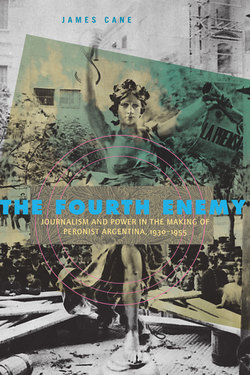The Fourth Enemy

Реклама. ООО «ЛитРес», ИНН: 7719571260.
Оглавление
James Cane. The Fourth Enemy
Отрывок из книги
The Fourth Enemy
The Fourth Enemy
.....
In addressing the multiple conflicts within and surrounding the Argentine newspaper industry, Peronists fashioned a discourse of the social role of journalism that posited the state not as a threat to the functioning of the press, but as a defender: of the “true press” from the corrupting influence of commerce; of public opinion from the distorting effects of powerful private interests; of newsworkers from newspaper proprietors; of smaller news organizations from more powerful ones; and of the newspaper industry as a whole from very real external economic shocks and internal production bottlenecks. Perón and his allies, with the balance of state power in their hands, portrayed their actions as falling within the bounds of this discourse, combining their arguments with a capacity for concrete action that outstripped, delegitimized, and divided the opposition. That the confiscation of La Prensa took place through formally legal channels and under conditions of constitutional normality reveals more than the extent to which Peronists had come to dominate Argentine political life. It also reveals the degree to which opponents of Perón failed to articulate convincing alternative visions of the social role of journalism and the press that recognized not just the profound changes inaugurated by Peronism, but the commercial transformation of the press itself in the twentieth century.
Four interrelated processes helped create these circumstances. First, the industrialization of newspaper production produced a press clearly different from that envisioned in classical liberalism, as newspaper institutions became increasingly capital-intensive, profit-oriented organizations. The potentially exclusionary implications of this process for the universal practice of public expression and the distorting power that commercial interests might exert on the means of social communication became important elements in criticism of the press as early as the 1910s. Allegations that the “marketplace of ideas” had degenerated into nothing more than a market in commodities and audiences only increased in the crises of the 1930s and 1940s, setting important precedents and providing useful fodder for subsequent Peronist critiques.40
.....